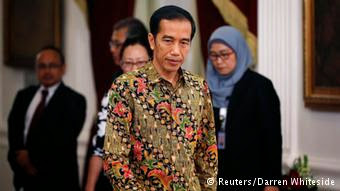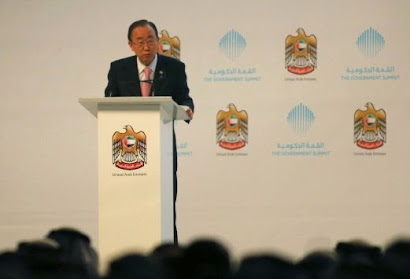 |
Dancers from ‘We Are From the East,’ choreographer Jecko Siompo’s
exploration of the connection between hip-hop and Papuan traditional dance.
(Photo courtesy of Goethe-Institut) |
Related Articles
A group of 10 dancers kneel on the floor. The upper bodies of the male dancers are painted in black and white while their female counterparts wear short brown dresses. They slowly raise their bodies to the rhythm of drums amplified over loudspeakers to a heart-stilling thunder. As they rise, they move in unison with the music and, as the beat gets faster, so do their movements. Eventually the stage becomes a whirling blur of movement, limbs twisting and bodies twirling with speed and grace.
This is a scene from “We Came From the East,” a new dance production by Indonesian choreographer Jecko Siompo.
“Hip-hop was born in Papua. You don’t have to believe me. But my great-grandmother told me,” Jecko boldly declared during a press conference at the Goethe-Institut in Jakarta on Thursday.
Jecko was referring chiefly to dance moves from Papua, which he claims form the foundation of the hip-hop and modern street dancing movements, rather than hip-hop music.
This theory underpins “We Came From the East.” One of Jecko’s main goals for the performance is to show, through his choreography, how ancient, traditional dances from his native Papua became the basis of modern hip-hop and breakdancing.
During the hour-long show, his troupe of dancers — eight from Indonesia and two from Germany — use dynamic performances to illustrate the connection between traditional and modern styles, bringing together folklore and pop culture. The production also features Jecko’s signature choreography style, which he calls “animal pop” because it is based on the movements of wild creatures.
“We Came From the East” will be performed at the Goethe-Institut on Tuesday night before the troupe travels to Hamburg, Germany, for the show’s official world premier a week later. It will have a run in Berlin in August before traveling to Singapore and Melbourne in October.
“We hope that we can convince Jecko to perform ‘We Came From the East’ again next year,” said Frank Werner, the head of cultural programs at the Goethe-Institut.
“That’s because there is one thing that is quite typical of Jecko’s pieces — they change, they grow and they get better over time.”
“They’re like a good bottle of red wine,” he added with a laugh. “They mature.”
In fact, Jecko and Goethe-Institut share quite a long history.
“Our collaboration with Jecko is almost a decade old,” Werner said. “It all started in 2002, when Jecko staged a premiere here.”
That same year, Jecko received a scholarship from the German Cultural Institute to study at the renowned Folkwang Dance Studio in Essen, Germany. A graduate of the Jakarta Arts Institute, he has been a guest at international dance festivals and meetings around the world, both as a dancer and a choreographer, ever since.
Werner said that the show’s international tour proved that Jecko has, in addition to becoming a renowned choreographer in Indonesia, managed to make his mark outside of his home country.
“Of course, we feel very privileged and proud that Jecko always chooses the Goethe-Institut as the first stage to present his pieces, which makes us part of his international success,” Werner said. “But actually, it is more than just a collaboration — it has to be seen within the larger framework of ‘Tanzconnexions.’ ”
Tanzconnexions (Dance Connections) is a five-year project put on by the Goethe-Institut that aims to foster artistic exchanges in the fields of dance and choreography between Asia and Europe through workshops and co-productions.
In fact, “We Came From the East” can be considered a co-production between Jecko, the Goethe-Institut Indonesia, Kampnagel Hamburg, Hebbel-am-Ufer Berlin (both theaters in Germany), and the Esplanade-Theaters on the Bay in Singapore.
In early 2010, Jecko was invited by Kampnagel Hamburg to present his piece, “Room Exit,” which helped him gain renown at an international level.
Werner said, “‘Tanzconnexions’ contributed a lot to making Jecko’s latest production happen, but, in the end, it is his artistic skill, experience and genius that makes it a wonderful piece.”
‘We Came From The East’
Tuesday, April 12, 8 p.m.
Goethe-Institut
Jl. Sam Ratulangi No. 9-15, Menteng, Central Jakarta
Tel: 021 2355 0208
www.goethe.de/tanzconnexions
















